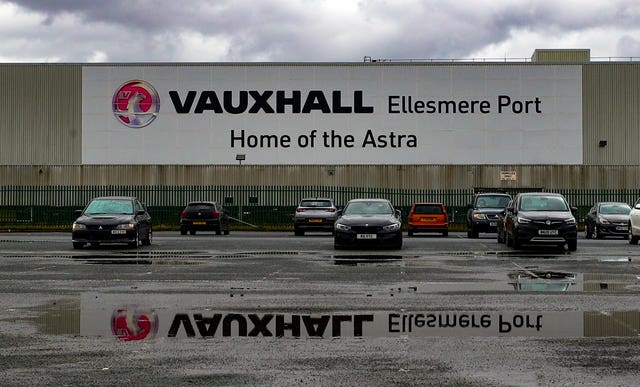The owner of Vauxhall has announced plans to shut its Luton van-making factory, putting more than 1,100 jobs at risk.
Stellantis, which also owns brands including Citroen and Peugeot, said it was expecting to close the site in April next year.
The closure forms part of the group’s proposal to consolidate its UK manufacturing of vans to create an all-electric hub at its Ellesmere Port plant, in Cheshire.
It is set to invest £50 million in the Ellesmere Port site, as it steps up efforts to meet the Government’s zero-emission targets.
About 1,120 full-time employees work at the Luton factory, which currently makes light commercial vehicles.

Stellantis said it had launched a consultation with employees and union partners on its proposals.
If they are approved, hundreds of permanent jobs will be created at the Cheshire-based factory for affected staff who wish to relocate, the firm said.
Stellantis also said it would offer job support, including opportunities for retraining, to all those impacted – and will work with local government and employers to find new work for Luton-based employees.
A spokesman for the Government said: “While it’s encouraging to see Stellantis investing in the future of its Ellesmere Port plant, we know this will be a concerning time for the families of employees at Luton who may be affected.
“We have a longstanding partnership with Stellantis and we will continue to work closely with them, as well as trade unions and local partners on the next steps of their proposals.”
Stellantis plans to have the consolidated production line at Ellesmere Port in operation by the second half of the 2026.
The Ellesmere Port factory makes battery-electric light commercial vehicles including for Vauxhall, Citroen, Peugeot and Fiat.
The carmaker said the plans could contribute to making its production more efficient, in light of the Government’s zero-emission vehicle mandate.
This requires 22% of all new car sales to be battery-electric vehicles in 2024, with the target rising to 80% by 2030 and 100% in 2035.
The Government’s spokesman added: “The Government is also backing the wider industry with over £300 million to drive uptake of zero-emission vehicles and £2 billion to support the transition of domestic manufacturing.”




Why are you making commenting on The National only available to subscribers?
We know there are thousands of National readers who want to debate, argue and go back and forth in the comments section of our stories. We’ve got the most informed readers in Scotland, asking each other the big questions about the future of our country.
Unfortunately, though, these important debates are being spoiled by a vocal minority of trolls who aren’t really interested in the issues, try to derail the conversations, register under fake names, and post vile abuse.
So that’s why we’ve decided to make the ability to comment only available to our paying subscribers. That way, all the trolls who post abuse on our website will have to pay if they want to join the debate – and risk a permanent ban from the account that they subscribe with.
The conversation will go back to what it should be about – people who care passionately about the issues, but disagree constructively on what we should do about them. Let’s get that debate started!
Callum Baird, Editor of The National
Comments: Our rules
We want our comments to be a lively and valuable part of our community - a place where readers can debate and engage with the most important local issues. The ability to comment on our stories is a privilege, not a right, however, and that privilege may be withdrawn if it is abused or misused.
Please report any comments that break our rules.
Read the rules here